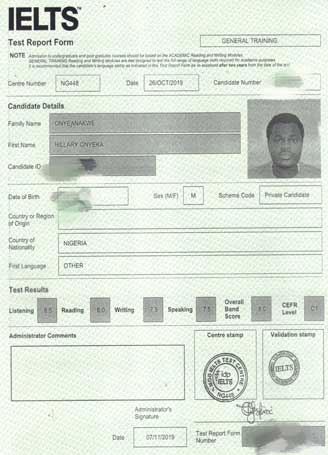Today we are sharing exam preparation tips from Hillary – a winner of IELTS results competition with an Overall Band Score of 8.0.
Hillary lives in Nigeria and, as you may have guessed, English isn’t his first language, so his experience studying for IELTS and the problems he faced could be similar to yours. Have a read through Hillary’s advice and recommendations and make sure to apply at least some of them to your own study.

Hillary said: “IELTS is one test that is seen by many as an obstacle to their progress, but I made sure that I took it as a means to an end and not an obstruction.
In tackling the IELTS, you need to have the positive mindset first of all. You need to believe that you can ace it and ensure that you utilise the resources available to you in making this happen.
Two criteria that are often overlooked while preparing and taking the IELTS are Vocabulary (Lexical Resource) and Grammar (Grammatical Range and Accuracy). Also, some attempt to increase their range of vocabulary and grammar while sidestepping accuracy.
There is therefore a need to ensure that one has a wide range of these two criteria while ensuring that the word choice is as accurate as possible. Do not use a word that you do not know its usage in terms of context, meaning, synonyms etc. It is best to avoid using an advanced word if you are unsure of its accurate usage. Use a simpler one instead that you feel confident about.
There is no gainsaying that one needs to prepare adequately and consistently. Ample time has to be set aside for preparation. When you have successfully aced the IELTS you can always return to your normal routine as it was before the test.
Make an effort to read, listen, speak and write in the English language regularly especially if the English language is not your first language as is the case with most of the candidates. This helps to sharpen your skills and make it easier for you on the test days. Podcasts, documentaries, newspapers, novels etc also help in making this fun.
You can also make use of some helpful books while preparing. You do not need to be exposed to an excessive amount of them, just the ones that can really help you in achieving your aim of hurdling over IELTS. Personally, I made use of ‘IELTS Success Formula General: The Complete Practical Guide to a Top IELTS Score’ by Simone Braverman and Stephen Slater. This book was really helpful in making preparation less stressful for me and easier to ace. I also found the Fitness Activities and Writing Doctor section in it very helpful. Another book I also made use of was a free trial version of ‘Ace the IELTS: IELTS General Module’ by Simone Braverman.
Another point of note is to ensure that while practicing for the Listening and Speaking tests, you look for your weak areas and work on those areas. These areas may be Map section, Multiple choice questions or T/F/NG. Find out what you are doing wrong in these areas and fix it. By doing that, there will be an improvement in your Listening and Reading scores.
For your Speaking test, you can simply practice with a partner who is also taking the test or find a friend or family member that can act as the interviewer after you must have put them through the process. If all these are not possible, you can record your responses with your mobile phone and analyse each criterion of the Speaking Test.
My advice with the Writing test is to read up on effective strategies and structures. You should ensure that you not only read Model Band 9 Letters and Essays, but also write. This helps to note what your typical task lengths are, to avoid writing responses short of the word limits. It also builds up your confidence level and you don’t get thrown off balance on test day.
I also recommend that you plan your essay before writing, have a list of synonyms for words from your question prompt that will likely be commonly used throughout your writings to avoid repetition and build your Lexical Resource score. For paragraphing use the block style while leaving a blank line between paragraphs rather than the indent style. Based on my proficiency with the English language, I didn’t see a need for any writing correction service but if you have a dire need of it, I will advise that you engage the Writing Correction Service as it will very likely help you.
I will also need to chip in that just as you must have familiarized yourself with the Band scores’ calculation for the Listening and Writing tests, ensure that you also download and make use of the Public Band Descriptors for the Writing and Speaking tests as they will help in guiding you.”
If YOU got a high score in IELTS, no matter when – this month, last month, a few months ago – we want to hear from you! Take part in our IELTS results competition today, and share your IELTS tips when you win!
https://ift.tt/2S3G4ir
from IELTS-Blog https://ift.tt/2PvQg1w
via IFTTT
No comments:
Post a Comment